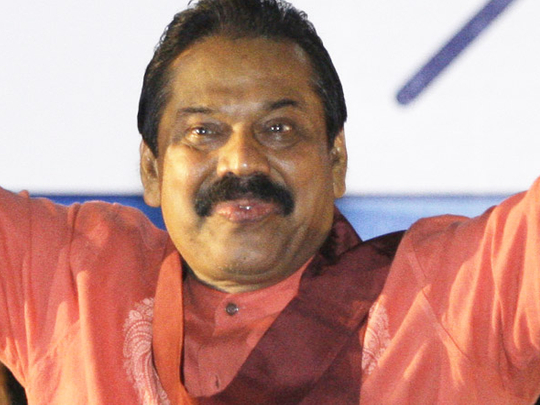
Colombo: Sri Lanka's powerful president, Mahinda Rajapakse, was to be sworn in Friday for a second six-year term that he promises will witness an economic rebirth after decades of ethnic conflict.
Rajapakse, who turned 65 Thursday, was to take his oath of office on an open-air stage overlooking the Indian Ocean, and then review a military march-past by thousands of troops.
Security was tight for the ceremony in the capital Colombo where a holiday was declared to mark the occasion, which comes 10 months after his re-election victory in January's presidential polls.
Rajapakse had called the election two years early to take advantage of soaring approval ratings in the wake of last year's military victory in the decades-old civil war with Tamil Tiger rebels.
The Supreme Court ruled that his inauguration should be delayed until the anniversary of his initial November 2005 presidential win.
Rajapakse begins his fresh mandate from an unprecedented position of strength following a constitutional revamp two months ago that further strengthened his executive powers.
With his personal popularity still running high, family members in key government positions, the opposition divided and his only serious political rival in prison, the president's control over the island republic seems complete.
Brushing off concerns voiced by countries like the United States that his powers pose a threat to Sri Lanka's democracy, Rajapakse insists they are necessary to rebuild the country.
Vowing to make Sri Lanka the "wonder of Asia," he has unveiled a series of ambitious infrastructure projects, including a 1.5-billion-dollar port in the southern town of Hambantota that he opened on Thursday.
"When I came to power I promised an honourable peace and a new Sri Lanka. I have kept my promise and built a new country," Rajapakse said at the televised opening ceremony.
While pursuing development, he has shrugged off attempts by the West to link aid and investment to human rights and turned to countries like Iran, Libya and China for help.
Rajapakse has also rejected allegations that the army may have been responsible for substantial civilian deaths during its final offensive against the Tamil Tigers and has dismissed calls for a probe into possible war crimes.
The central bank expects Sri Lanka's economy to grow 8.0 percent in 2010, up from 3.5 percent last year, and Rajapakse has promised to double GDP per capita to 4,000 dollars by the end of his second term in 2016.
Political analyst Paikiasothy Saravanamuttu said Rajapakse's focus on economic recovery would leave the issue of reconciliation with the island's Tamil minority on the backburner.
"Any talk about political reform is considered irrelevant at best and subversive at worst," said Saravanamuttu - an opinion echoed by the Brussels-based International Crisis Group (ICG).
"There is no sign the government has any interest in doing any of the things necessary for reconciliation between and within communities damaged by so many years of war," said ICG's Sri Lanka Project Director Alan Keenan.
Apart from being president and commander-in-chief, Rajapakse is the minister of finance, ports and aviation and highways.
His elder brother Chamal is the speaker of parliament, younger brother Basil the economic development minister and another brother, Gotabhaya, the powerful defence secretary.
Rajapakse's main political rival, former army chief Sarath Fonseka, is currently serving a 30-month jail sentence after a court martial found him guilty of military procurement offences.
Fonseka, who also has several criminal cases pending against him, was arrested shortly after his failed effort to unseat Rajapakse in presidential elections in January.
With no visible political threat on the horizon, Rajapakse is able to look even beyond his second mandate thanks to the constitutional changes pushed through in September that also scrapped a two-term limit on the presidency.












